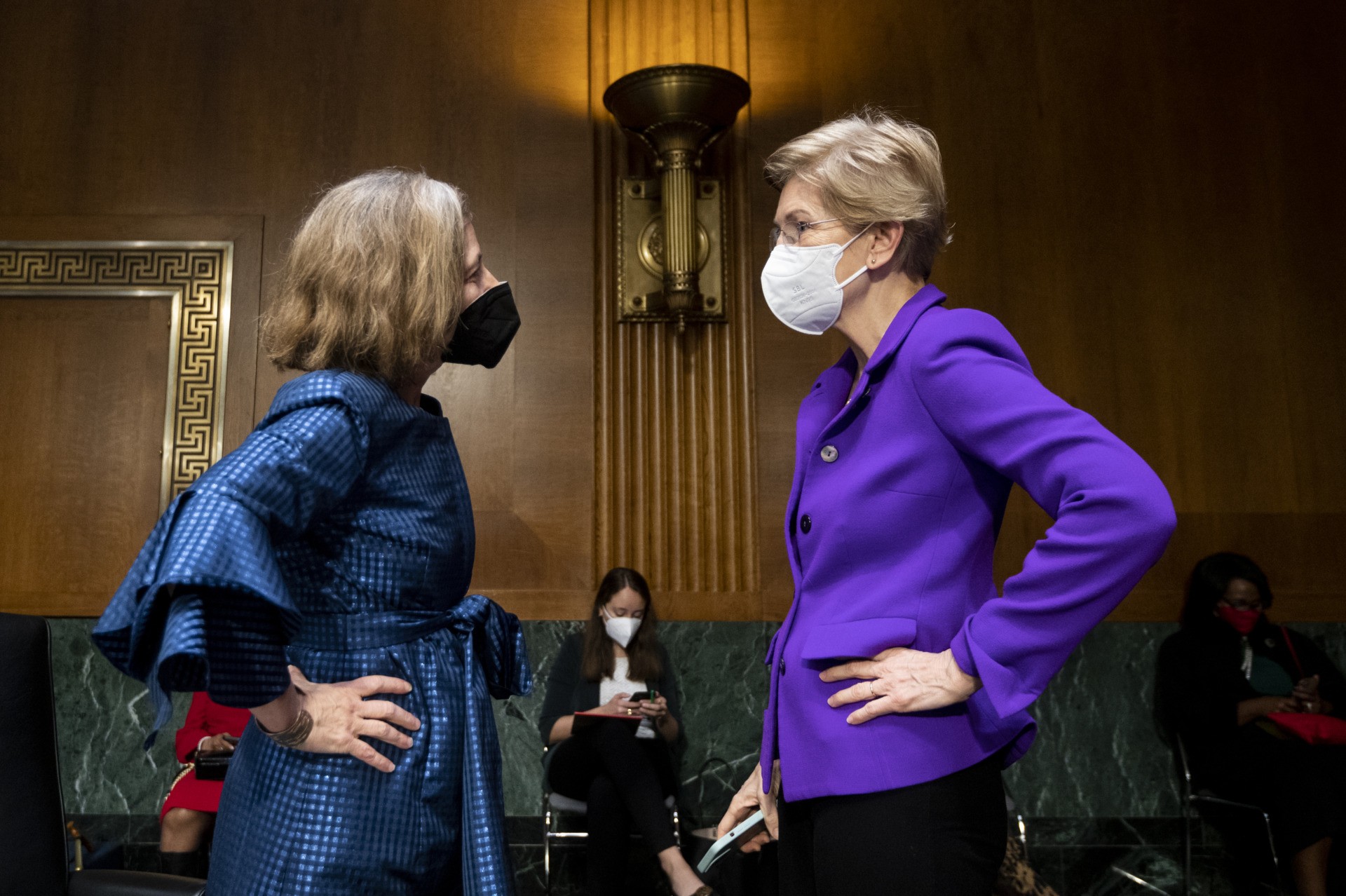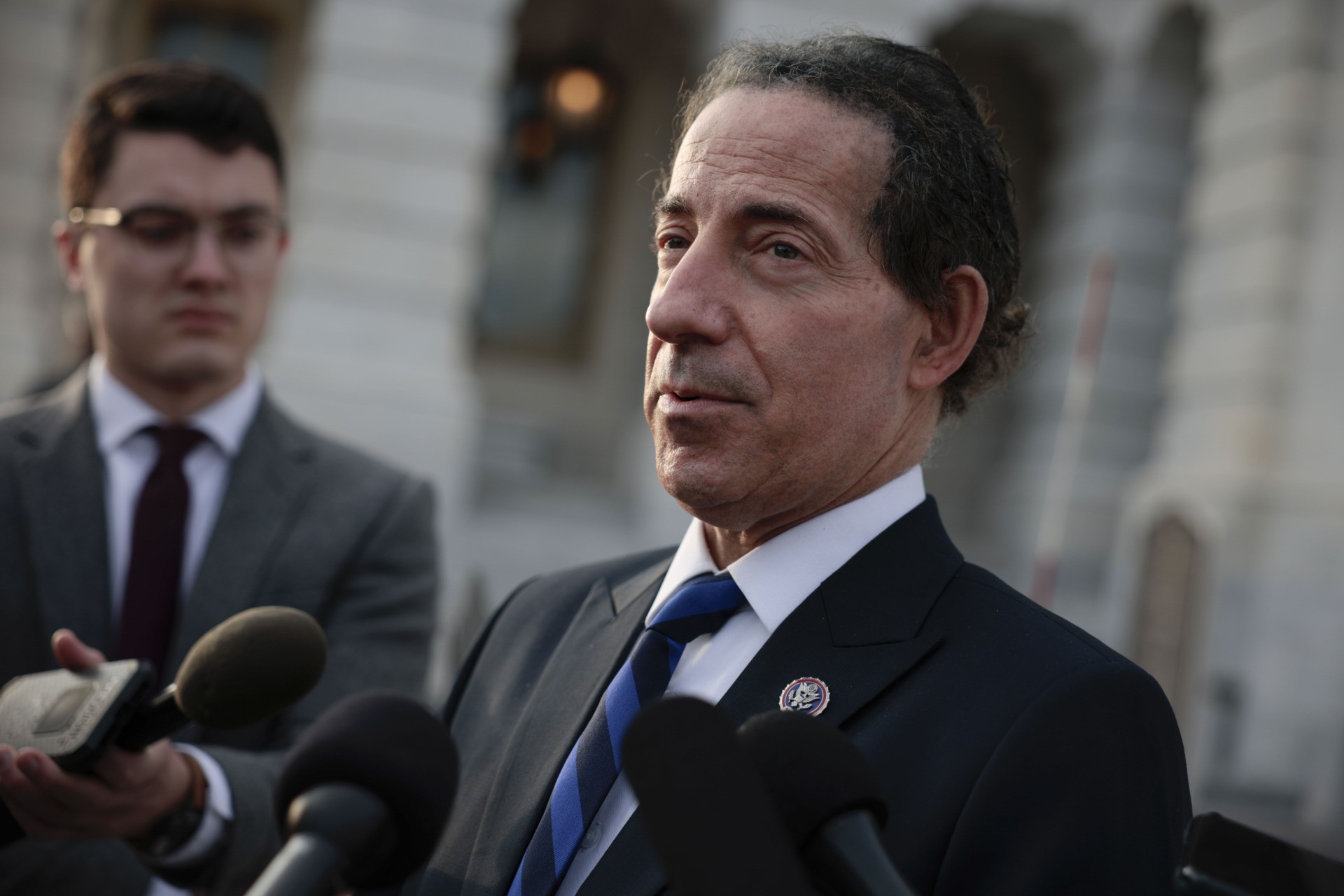In his Build Back Better (BBB) legislation, President Joe Biden wanted to spend $570 billion over the next decade on green causes, mostly focused on climate change. Fortunately, that bill seems to be dead, and yet now the Biden greens (that is to say, the Biden administration) have their eye on an even bigger pot of money with which to pursue their climate agenda: the assets of American banks. Those assets total nearly $23 trillion, according to the Federal Reserve. A crucial vote on whether or not this sneaky policy can proceed will be held tomorrow when the Senate’s banking committee votes on whether to advance Biden’s Federal Reserve nominees, particularly the nomination of Sarah Bloom Raskin as the Fed’s top bank regulator.
Where the Money Is
Speaking of the Federal Reserve System, the Fed, as it is called, is the principal body that oversees and regulates banking in the U.S. After the failure of BBB, the Fed is Biden’s preferred mechanism for advancing his version of the Green New Deal. After all, the Fed has vast powers over the banks—including whether or not they can lend money to, or otherwise finance, fossil-fuel companies. From a Bidenite point of view, this seems like a clever strategy; as has been said of banks, “That’s where the money is.”
Specifically, Biden wants to gain control of the Federal Reserve’s seven-member Board of Governors. Of these seven slots, three are currently vacant. On January 14, the White House named three candidates to fill those slots, all of them friendly to his green scheme. If that trio is confirmed by the Senate, they will join a fourth Democrat already on the board, and the left will have gained control of the Fed.
Yes, the Bidenites have visions of that $23 trillion—and what they can do with it—dancing in their heads. The banks have their $23 trillion, and the Fed has its regulatory power, and so the Fed can rewrite banking rules to choke off financing for fossil-fuel companies.
This regulatory option is a ray of hope for embattled Democrats, because their elected officials, eyeing recent election results and current polls, have grown leery of overt actions to choke off energy, and thus tank the economy. That’s why legislative efforts to block energy lending have ground to a halt.
Instead, sly Democrats prefer covert actions, the kind they hope will leave no political fingerprints. That’s where the Fed comes in: Democrats hope that an “independent” Fed can do all the choking behind the scenes; that is, without Democratic pols actually having to vote on unpopular energy reductions. Far better, Dems figure, to let un-elected bureaucrats do the dirty work.
On January 29, this author sketched the outlines of this sneaky strategy: “Biden’s ‘Big Shift’ on Climate Change Is the ‘Great Reset’ by Stealth.” (The Great Reset, of course, is the green-globalist agenda put forth by the German Klaus Schwab and the World Economic Forum, aka, Davos.)
The key to this Great Resetting strategy is Sarah Bloom Raskin, tipped by Biden to be the Fed’s Vice Chair for Supervision; which is to say, she’d have direct authority over the workings of private banks. The other two nominees for seats on the Board of Governors are Lisa Cook and Philip Jefferson.
Raskin has written many times about bending finance to transform the American energy sector in a way that would gladden the Sierra Club. As I noted last month, “The Biden plan is that the Raskin-ized Fed will join with other mostly obscure agencies, such as the Office of the Comptroller of the Currency, to steer (read: scare) investors away from fossil fuel companies.”

Sarah Bloom Raskin, nominee to be vice chairman for supervision and a member of the Federal Reserve Board of Governors, is sworn in during the Senate confirmation hearing on February 3, 2022, in Washington, DC. (Bill Clark-Pool/Getty Images)

Lisa DeNell Cook, nominee to be a member of the Federal Reserve Board of Governors, is sworn in during the Senate confirmation hearing on February 3, 2022, in Washington, DC. (Bill Clark-Pool/Getty Images)

Philip Nathan Jefferson, nominated to be a Member of the Board of Governors of the Federal Reserve System, is sworn in during a Senate confirmation hearing on February 3, 2022, in Washington, DC. (KEN CEDENO/POOL/AFP via Getty Images)
Wait! There’s More!!
In the meantime, another of Biden’s nominees for the Fed has come under scrutiny. That would be Lisa Cook, a professor at Michigan State University.
In the sharp words of Hoover Institution economist John Cochrane, a look at Cook’s academic output shows “essentially nothing related to monetary policy, monetary effects on employment, interest rates, inflation, financial regulation or other traditional Fed topics.” Instead, Cochrane continued, Cook seems best equipped to “bring the Administration and progressive supporters’ racial policies to the Fed.” That is, in Cochrane’s view, she’d be a better hard-left diversity officer than a careful central banker.
But there’s no need to take Cochrane’s word for it. Here’s Cook in her own words in a 2020 podcast:
Everybody benefited from slavery, everybody. Everybody in the economy at the time—besides those who were enslaved persons or related enslaved persons—benefited from the economy at that time. We have to come to terms with that.
And so, Cook continued, we need to move toward reparations for slavery:
I think that we absolutely need some sort of reckoning. . . . There are many proposals on the table to study the possibility of reparations, many economic proposals being put forward, and I think they should all be taken seriously. . . . We learn more, so we need to do more.
We can add that offering reparations is another one of those lefty causes that reelection-minded Democrats don’t want to touch; so once again, they think it is best to shunt the mission off to unelected officials–the kind voters can’t touch–to see what they can figure out. (And for a reparations-minded governor at the Fed, that $23 trillion held by banks provides a mighty fine target of opportunity.)
Cook’s racial preoccupations are so strenuous that even the mainstream media are noticing; hence this February 2 headline in Politico: “Biden nominee ensnared in debate over ‘woke’ Fed.” Reviewing her record, Sen. Kevin Cramer (R-ND) judged Cook to be “fundamentally not qualified.”

Dr. Lisa DeNell Cook speaks before a Senate confirmation hearing on February 3, 2022. (Ken Cedeno-Pool/Getty Images)
Strong Republican Opposition
Still, the main focus is on Raskin, she of the green dream, of using the Fed to please Greenpeace. On February 2 the Wall Street Journal published an op-ed by two energy trade association officials, “‘No’ on Sarah Bloom Raskin.” As the authors put it, “Ms. Raskin’s public statements make clear that she would use this position to reshape our financial system in ways Congress never intended.” They added:
The Fed’s only mandates are stable prices and low unemployment. That’s why it’s endowed with such independence and power—it isn’t meant to be political. Whether the government limits fossil fuels is the purview of elected representatives in Congress, not insulated bureaucrats.
Indeed, an open letter opposing Raskin and signed by 41 energy associations—from the Alaska Oil and Gas Association to the Pennsylvania Independent Oil and Gas Association—is circulating widely on Capitol Hill.
Speaking for another energy-producing region, the Southeast, Sen. Bill Cassidy (R-LA) was loud and clear on Raskin:
For someone to be nominated who wishes to destroy the oil and gas industry, not on a rational basis, but based on a prejudice and a dream that we no longer need fossil fuel, is dangerous for the workers of Louisiana. It is dangerous for the consumers in this country. It is dangerous for our foreign policy and national security. In short, it is dangerous for the world. Our economy depends on clear-minded, nonpartisan monetary policies, not activists in the Fed carrying out an ideological and political agenda.
Okay, so it’s easy to peg Raskin is a green ideologue bent on unemploying Louisianans, as well as many others across the country. According to the American Petroleum Institute, total national employment in the fossil-fuel industry is currently 9.8 million.
In the meantime, surveying the troubled energy scene, Democratic Senators—the folks who will be called upon to vote in support Raskin’s nomination—are getting nervous. As a sign of their nervousness, just on February 9, six of them (four up for re-election in 2022) called for a suspension of the federal gas tax as a way of reducing pump-pain for motorists.

Sen. Elizabeth Warren (D-MA), right, speaks with Sarah Bloom Raskin, nominee to be vice chairman for supervision and a member of the Federal Reserve Board of Governors, before the start of the Senate confirmation hearing on February 3, 2022, in Washington, DC. (Bill Clark-Pool/Getty Images)
That might be a clever enough political tactic, pushing down gas prices, and yet we can observe: It’s the opposite of the approach that Raskin favors: As we have seen, she wants to make carbon-energy scarcer, which would, of course, make it more expensive. So how will those six Democrats who want to reduce gas prices regard Raskin? Will they think that if they are call loudly for reducing gas prices (making voters happy) that they can then get away with voting “aye” on Raskin, who will ultimately raise energy prices (making donors happy)? Stay tuned.
To be fair, we should note that Raskin has taken, lately, to disavowing her old views on using the Fed to clobber the carbon-energy companies. You know, her old views, the ones she expressed in 2020 and 2021. Now, in 2022, facing the risk of rejection by the Senate, she’s changed her mind, she insists. Honest! But we can ask: If she changes her mind in 2022, why couldn’t she change her mind again in 2023? Or, for that matter, the day after she is confirmed?
Of course, it’s safest to assume that she is just trying to sneak her way onto the Fed, that her real views haven’t changed at all. So out of fairness, we note her new line, and out of common sense, we keep our guard up.
One important figure who is keep his guard up is Sen. Cassidy, representing oil-and-gas-rich Louisiana, who argues that the problem is broader than Raskin–the problem is the Biden administration itself. As he said on Fox News Sunday on the 13th, “Right now this administration is putting in amber, the ability of the U.S. to expand its energy supply. That’s why we’re paying more for gas and natural gas.”
Still, the most immediate question is Raskin; the Senate Banking Committee is scheduled to vote on her nomination on the 15th; if she survives that vote, her name then goes to the full Senate.
Yet there’s more to the story than just Raskin as an enemy of Main Street. She is, at the same time, mostly a friend of Wall Street.
Today’s High-Finance Left
If Raskin’s last name seems familiar, that’s because she’s married to Rep. Jamie Raskin (D-MD), a left-wing legislator, Trump impeachment leader, and January 6 hunter. Indeed, through that power couple, we get a peek into the new look of the left, which is decidedly luxe.
As an historical aside, it’s worth recalling that Jamie Raskin is the son of Marcus Raskin (1934-2017), a longtime left-wing activist who was repeatedly accused of being in league with the old communist Soviet Union. Yet even if the younger Raskin has a red background, these days he has a green side—and not just the green of environmentalism, but also the green of money — as in, high finance and maybe some hanky-panky to boot. As Breitbart News reported on February 3:
Raskin took eight months to disclose his wife’s sale of 195,936 shares of Reserve Trust, where she sat on the advisory board. This sale resulted in $1.5 million in profit for Raskin’s wife.
We can marvel: This is a company Ms. Raskin joined in 2017, and from which she departed in 2019. So $1.5 million went to Ms. Raskin for sitting on an advisory board for two years. Not bad!
Yet as for Mr. Raskin’s delay in reporting that windfall, that would appear to put him in possible violation of the STOCK Act. That is a 2012 law, formally known as the Stop Trading On Congressional Knowledge Act, which prohibits members of Congress from various financial shenanigans, including not reporting spousal profits.

Rep. Jamie Raskin (D-MD) speaks with reporters outside the U.S. Capitol Building on November 16, 2021. (Anna Moneymaker/Getty Images)
Not surprisingly, enforcement of this statute has been spotty; just this year, House Speaker Nancy Pelosi was brazenly trading millions in stocks, an obvious trampling of at least the spirit of the STOCK Act. And as for Rep. Raskin, it’s not clear that he would have ever disclosed that $1.5 million had not his wife been up for the Fed post.
To return to Ms. Raskin, we can wonder: What exactly did she do to receive that $1.5 million from Reserve Trust? We can readily see that “Reserve Trust” sounds a bit like the U.S. Federal Reserve—and that’s surely not a coincidence. Yet in reality, Reserve Trust is a completely private financial institution. More precisely, it’s “fintech.” That is, it is a part of the new financial-technology realm of cryptocurrencies, blockchain, and other digital exotica, the long-run implications of which nobody understands.
Yet in the here and now, Reserve Trust plays up its close connection to more familiar financial institutions, including the Fed. On its website, the company touts itself as “the first fintech trust company with a Federal Reserve master account.” A master account, as the name suggests, puts the holder at the front of the line for Fed banking operations.
So we can see that in addition to being an environmental green, Ms. Raskin, like her husband, is fully familiar with financial green, as a policy-maker, as well, of course, as a profit-taker.
In fact, from 2010 to 2014, Raskin was a member of the Fed’s Board of Governors, and from 2014-17 she pulled duty as Barack Obama’s deputy secretary of Treasury. Since then, as we have seen, Raskin has reaped plenty of green. (In 2018, Rep. Raskin’s Congressional disclosure form showed a net worth of up to $6.01 million; it’s unclear whether that total includes all of her wealth.)
Most likely, the Raskin family’s wealth is still piling up nicely, because Raskin keeps working the system. And that’s come to the attention of Sen. Pat Toomey (R-PA), the ranking Republican on the Senate Banking Committee; on February 11, he denounced Raskin for seemingly inappropriately lobbying on behalf of Reserve Trust:
While it may be routine for your average company director to call a regional Fed bank, there is nothing routine about a former Fed Governor, like Ms. Raskin, calling the president of a regional Fed bank, with whom she previously served on the Fed’s Federal Open Markets Committee, about such a decision.
Given Raskin’s intimacy with finance, here’s something interesting, if not surprising, about her, full-spectrum green that she is: Raskin has plenty of support from the commanding heights.
To be sure, the fossil-fuel associations are opposing her, and yet at the same time financial services associations are supportive. As Politico reported on January 28, Raskin’s nomination “is dividing Big Banks and Big Oil.” For instance, cheerleaders at the Institute of International Bankers trill that Raskin’s résumé “demonstrates her intellect, qualifications, and commitment to transparency and integrity.”
So what gives? Why the split between the Bigs? The answer is that the financial sector has a different outlook than the carbon-energy sector. Without a doubt, financiers have been happy to make money dealing with old-line energy producers, and yet these days, they are even happier dealing with newer energy producers, such as those involved in solar and wind. Why? Because the banks know that the Washington Favor Factory has been showering left-favored energy sources with myriad subsidies, totaling some $100 billion over the last decade.
And by now the banks have figured out how to insinuate themselves into that rushing money stream; as clever crony capitalists, they know that what they need most are good relationships with D.C. decision-makers, such as Ms. Raskin—and, of course, Mr. Raskin.
In truth, the banks don’t really mind that they and their $23 trillion are being steered around by the federal government, because to them Uncle Sam is really Uncle Sugar. That’s the lesson the banks learned in 2008, when—after decades of bankers’ often reckless, predatory, and even illegal lending on home mortgages—the feds stepped in to bail out the financial sector. Happily for the big banks in particular, few questions were asked, no wrongful profits were clawed back, and perhaps best of all, nobody went to jail.
Just how much did that epic bailout cost the U.S.? Estimates vary wildly—from the federal government being out trillions to the feds making a profit—and yet a sober and exhaustive analysis by MIT’s Deborah J. Lucas, published in 2019, found that the net cost to the government was $498 billion. To put that another way, nearly half-a-trillion dollars were transferred from ordinary taxpayers to high finance.
To be sure, the country was hit hard during those years—unemployment went to 10 percent in 2009, and millions lost their homes and livelihoods—and yet the banks collected a no-strings $498 billion. And during most of the years of the bailout, Raskin was either at the Fed or at the Treasury, watching the money gush by. From a big banker’s point of view, what’s not to like about Raskin?
Given Raskin’s cronyistic track record, the banks have little reason to fear her being on the Fed once again, at an even higher position.
Green energy, financed at the behest of the Fed, may well prove to be a huge debacle of money-losing, and yet the banks aren’t worried, because the government has proven itself to be quick on money-replenishing.
Needless to say, if green energy melts down, the fate of America as a whole would be bleak. But the bankers, especially the big ones, don’t seem worried about that. Bailout history tells them to be right there with Raskin and the rest of the Great Resetters.
The vote in the Banking Committee on the nomination of Raskin, Cook, and Jefferson is scheduled for tomorrow. Here’s a list of all the members of the committee.

COMMENTS
Please let us know if you're having issues with commenting.